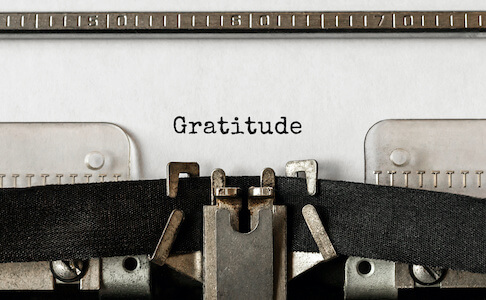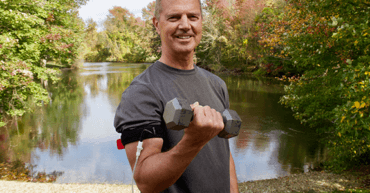November 24, 2020
The Healing Power of Gratitude

By Julie Gregory, Chief Health Liaison for Apollo Health
“Between stimulus and response, there is a space. In that space is our power to choose our response. In our response lies our growth and our freedom.” — Viktor Frankl
I can think of no other attitude that confers the transformational powers of healing as much as gratitude. One of the most powerful examples can be found in Viktor Frankl’s experience outlined in his book, Man’s Search for Meaning. Frankl was an Austrian neurologist and psychiatrist who survived unimaginable horror during the Holocaust. Despite his circumstances, however, he was able to transmute extreme deprivation and cruelty to attain high levels of gratitude for the little things — a colorful sunset or memories of those he loved. He was able to transform the horror around him into one of transcendence, giving him the ultimate power in a “powerless” situation. By harnessing gratitude, he found meaning, purpose, and significance.
Frankl’s message of gratitude and hope amidst suffering feels particularly relevant to us today. While the challenges imposed by the global pandemic largely pale in comparison to the atrocities experienced in the death camps, we’ve all experienced an unexpectedly difficult year. Each of us has been personally affected in some way. For many, our entire way of life has been disrupted due to the limitations conferred by the global pandemic. We’ve had to put travel, celebrations, and family rites of passage on hold. Many have experienced financial and emotional hardships from being isolated and separated from our loved ones. Some have been personally stricken with COVID-19, others are dealing with long-term consequences, and many have stood by helplessly as our loved ones have suffered and even died. The idea of gratitude amidst this backdrop may feel unattainable, but availing oneself of it can have profound effects on our health and well-being.
Research clearly demonstrates that people who regularly count their blessings are happier, less depressed, and tend to sleep better. They exhibit better self-care, exercise more, eat better, experience less physical pain, lower levels of inflammation, lower blood pressure, and more. Grateful people even show a difference in brain imaging by demonstrating increased neural connectivity in the medial prefrontal cortex, a part of the brain devoted to learning and decision-making. Science shows that when we express and receive gratitude, the neurotransmitters dopamine and serotonin are increased, immediately enhancing our mood and making us feel happy.
So, how can we harness the benefits of gratitude when we might be grieving, feeling burdened, or deprived by our current circumstances? We must first acknowledge that suffering and gratitude can co-exist and recognize that gratitude can propel us to a completely different perception of the situation, offering us power and freedom. Below are some tangible ideas for cultivating a sense of gratitude.
- Be kind to yourself: Cultivating a gratitude attitude doesn’t happen overnight. Many of us have to change years of negative thinking to get there. That’s OK. By adopting the Bredesen Protocol, you’re making great strides. You’ve chosen to prioritize yourself, optimize your health, and sharpen your cognition for years to come. The journey often begins with feelings of loss for your old way of life, which may be further compounded by the restrictions imposed by the pandemic. But, as you slowly adopt the diet and lifestyle changes summarized in the Bredesen Seven, you’ll feel your mood and energy change for the better. It becomes easier to find gratitude (and to stick with the protocol) once you’ve begun to experience the benefits of self-care. Be patient.
- Focus on the small things: Find gratitude in the little things that bring you joy. At this moment, the turmeric and ginger tea that I’m sipping and the old woolen socks that I’m wearing are conspiring to make me feel tingly inside. Search for those little things. It could be the weather on your skin or your pet’s affectionate nuzzle. Yes, the world has gone mad, but we are all surrounded by the little things in life that still make us happy. Be on the lookout for the extraordinary in the ordinary. Recognize it and be grateful.
- Don’t judge others: Just as you’re learning to be kind and patient with yourself, extend that to others. When my cognition was slipping, I was often short-tempered and impatient. Things that had always been easy for me were inexplicably becoming difficult, leading to frustration. Part of cultivating gratitude is recognizing that everyone is facing a struggle that they keep hidden from most of the world. When things go wrong, choose gratitude over judgment. By radiating kindness to others, you’ll feel better about yourself.
- Take a longitudinal perspective: We all have painful periods from our past that we can look back on and feel grateful that things turned out the way they did. We might look back on a lost relationship, and while we were devastated in the moment, now recognize that it was a blessing in disguise. Your partner at that time may have been an awful personality fit, but you failed to see it back then. Time gives us perspective to look back and find gratitude from prior losses. These junctures of pain often cause us to become more introspective and judicious moving forward, making better choices for our long-term happiness. Try to find gratitude in your current challenges by searching for the life lesson that can help lead to your personal growth.
- Find that moment and flip the script: Most of us spend a tremendous amount of time not being fully present. We tend to ruminate on past events or worry about future problems that may never even happen. By allowing our subconscious to take over, we’re actually missing out on the amazing life that is unfolding before us. I encourage you to try to catch yourself in that moment when your mind starts to wander negatively and gently and non-judgmentally bring yourself back to the present by using your senses. See what’s happening around you, hear the sounds, smell the smells, feel the air on your skin, and finally, be aware of the taste in your mouth. By being fully human and present, you can use your senses to find something in that moment for which you are grateful.
As I face my first pandemic Thanksgiving, I’m truly grateful for each of you. I keenly remember when I first learned about my very high genetic risk for Alzheimer’s at the same time that my cognition was slipping. I was given no hope and had no path forward. By finding other carriers of the ApoE4 gene and creating the ApoE4.Info community, I found my emotional support, my tribe, and ultimately Dr. Bredesen and all of you. Together, we are rewriting history. Cognitive decline no longer has to be a death sentence. We are learning which factors contribute to this pathology, how to modify them, and the course of this disease. We’ve created a community that is showing the rest of the world what is possible. Thank you for being a part of my world and helping me find hope.




